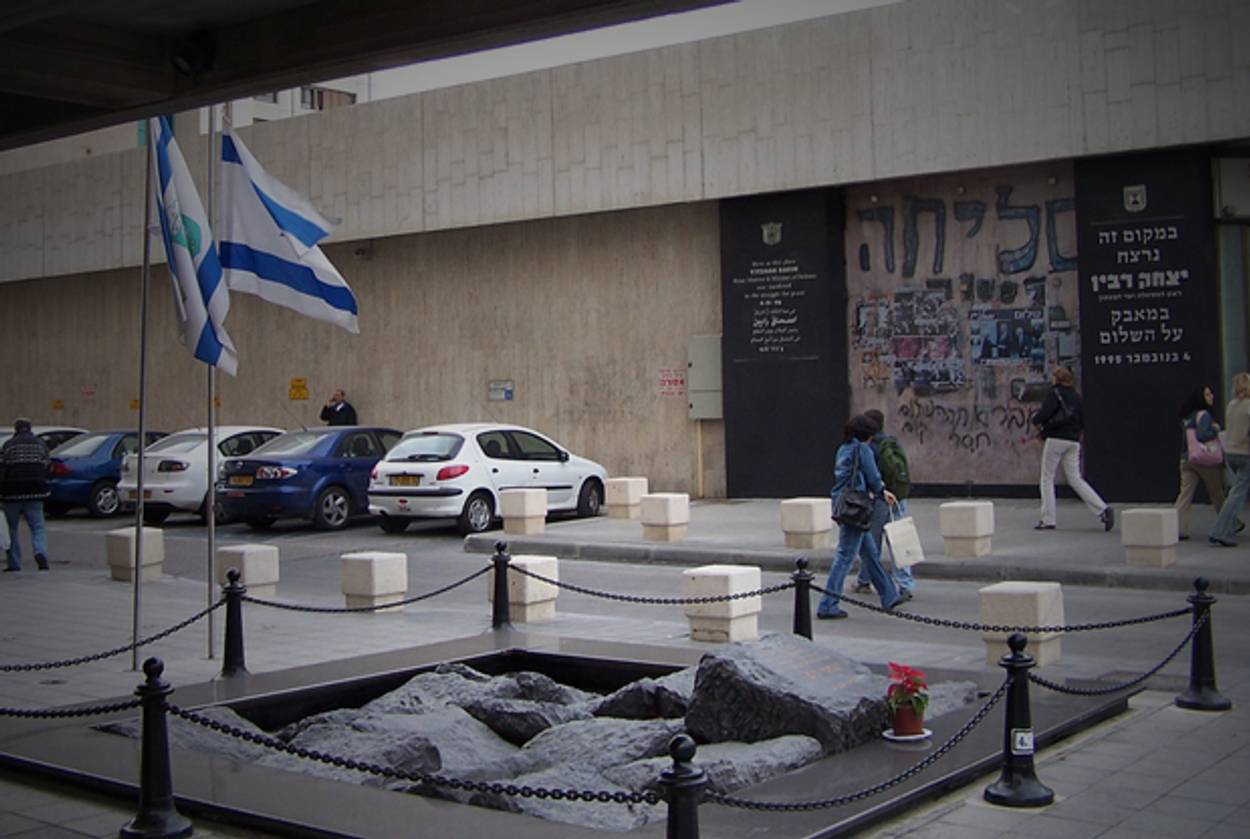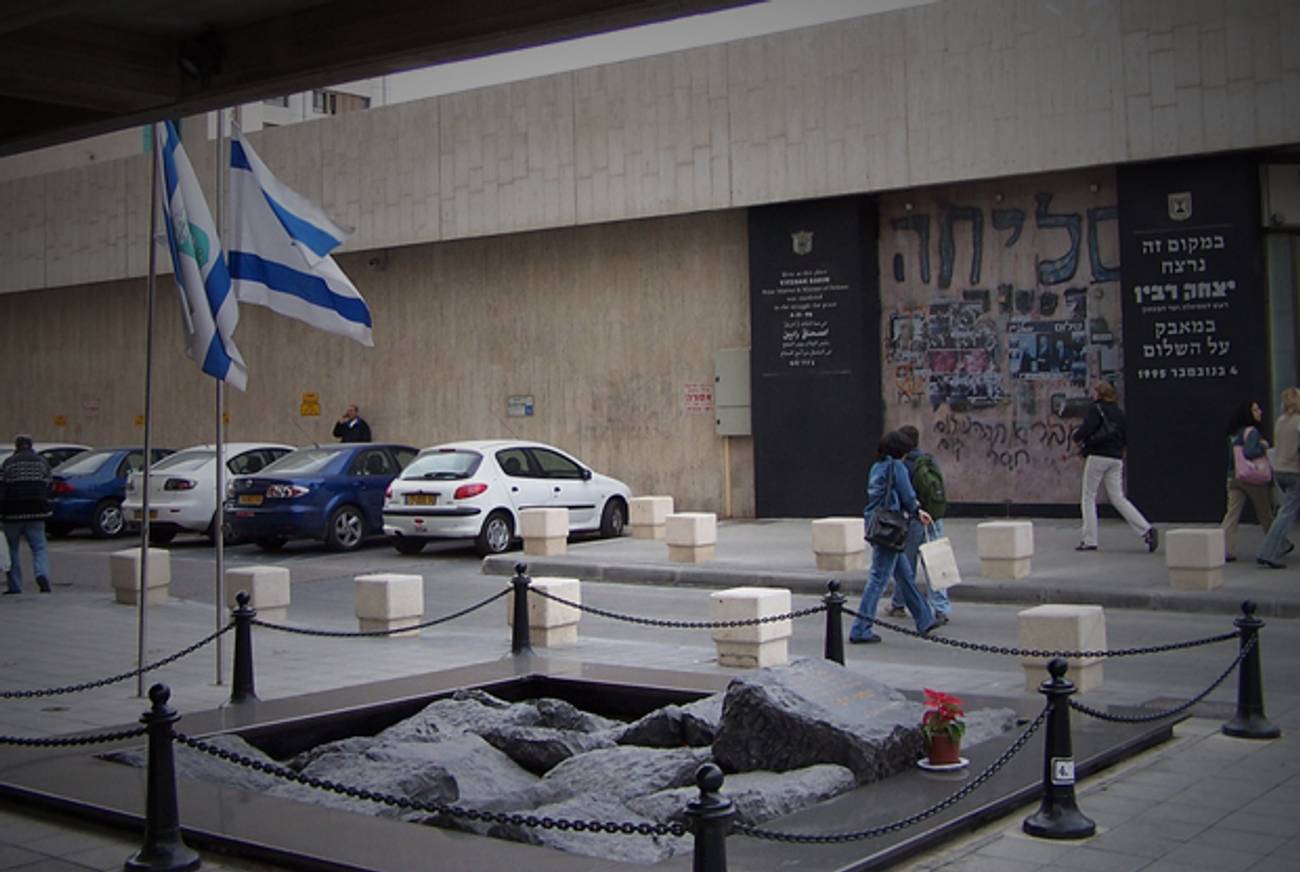Israeli Left on Life Support
On the anniversary of Rabin’s murder, the left-wing leadership can’t organize a unified rally to commemorate it




The announcement last week by Prime Minister Benjamin Netanyahu and Foreign Minister Avigdor Lieberman that their parties—the center-right Likud and the far-right Yisrael Beiteinu—would merge lists and run as one unified party in this January’s Knesset elections was a game-changer even by Israeli standards, where new parties appear and dissolve overnight. The new super-party virtually guarantees Netanyahu victory—and pundits, columnists, and regular Israelis have declared that this merger is the death knell of the Israeli left.
The truth is that the left-wing leadership has been asleep at the wheel for the past decade, prone to infighting among its ranks and unresponsive to an electorate anxious about Israel’s security. They have abandoned their rhetoric about national security for fear of sounding too dovish, preferring instead to talk about “social justice” as if that were the only issue facing the Jewish state. In so doing, they have allowed for the merger of Likud and Yisrael Beiteinu, since in the absence of any compelling alternative Israel’s body politic has shifted starkly to the right.
For evidence of this, one needn’t look any further than to what’s recently happened to the annual Yitzhak Rabin memorial rally, traditionally held on the Saturday night closest to Nov. 4, the date Rabin was murdered in 1995. Six years ago, the author David Grossman, still in mourning for a son killed in combat months earlier, gave what was probably the most chilling speech ever given at the Rabin rallies. He quoted the pre-state Hebrew poet Shaul Tchernichovsky—“behold land, how wasteful we have been”—and spoke of how Israel is squandering the miracle of its own existence by occupying another people. By this year, there was little talk of peace; in its place there was pop music and speakers who openly support settlement expansion.
***
For the past 17 years, the Tel Aviv square that bears Rabin’s name has been a site of annual pilgrimage for Israelis, especially those on the left. While never short of some controversy, with politicians welcomed one year and banished the next, the rally has been a reliable event every autumn—a place where tens of thousands of Israelis gather and fantasize about what might have been. In the real world, meanwhile, Rabin’s Labor Party was becoming a shadow of its former self. Prime Ministers Shimon Peres (1995-1996) and Ehud Barak (1999-2001) book-ended Netanyahu’s first term in the second half of the ‘90s, but both had very short tenures, and Barak’s ended with the outbreak of the Second Intifada. The party founded by David Ben-Gurion has spent much of the last decade serving as a junior member in Likud-led coalitions, apparently happy to play second fiddle while implementing policies at odds with their DNA rather than serving in the opposition and presenting a viable alternative.
This year’s rally was to be different. It started with the announcement that, for the first time, there wouldn’t be one rally. Instead, there would be two events. The traditional rally, led by longtime organizer Hemi Sal, would be held on Nov. 3, while a new rally, advertised as “the central rally,” would take place a week earlier under the auspices of Dror Israel, the alumni organization of HaNoar HaOved VeHaLomed, the youth group closely identified with the Labor Party. No one but the organizers of each seemed to understand why two rallies were warranted, but both Sal and Dror Yisrael’s Uri Matoki were adamant that their interpretation of the Rabin legacy was the one worth highlighting. Sal’s traditional rally wanted to emphasize the peace process, while Dror Israel favored the theme of tolerance in Israeli society. But realizing he’d been upstaged, Sal announced on Oct. 25 that his traditional rally was canceled, accusing Dror Israel of getting away with a hostile takeover of a national memorial event. (Later news reports cited budgetary woes.)
As a result, Dror Israel delivered a rally on Oct. 27 unlike any that had taken place before. Gone was the somber music; popular musicians like Yehudit Ravitz played upbeat hits. Traditional speakers like President Shimon Peres and former Minister Yossi Sarid were replaced by new faces. There was very little talk of peace—but everyone agreed on the value of civil discourse. Four of the speakers were Orthodox and some of them settlers, including Danny Hirschberg, the head of the national religious youth group Bnei Akiva, whose members showed up in full force for the first time in the rally’s history. Hirschberg equated the Jewish “price tag” activists who have set fire to mosques in the West Bank with Anarchists Against the Wall, the radical leftist group that regularly stages protests against the separation barrier, condemning both. Only one left-wing political figure spoke: professor Yuli Tamir, a former minister of education.
No one should belittle the importance of reaching out to all elements of Israeli society, particularly those religious Zionists ostracized in the aftermath of Rabin’s assassination because the killer was “one of their own.” But the willingness of the left, as typified by their willingness to cede the rally to voices from the right, to gloss over the things Rabin died for—ending the occupation for the sake of Israel, if not for the sake of peace—is symptomatic of a dangerous trend in Israeli society. The social protests over the cost of living that swept the country in the summer of 2011 temporarily energized the left but hardly ever mentioned the Palestinians. Labor’s new leader, Shelly Yachimovich, prefers not to talk about the occupation, arguing that national security rhetoric has been used for years to take people’s minds off the truly pressing economic issues. Netanyahu, having uttered the phrase “two-state solution” early on in his latest term, has done little to pursue said solution. Lieberman has more creative plans that entail wholesale land swaps with Israeli Arabs—victims of the fear-mongering to which he owes his political career—set to start a new life as Palestinian citizens.
There are many good reasons Israelis don’t have it in them to give peace a chance: The daily rocket fire on Sderot is a constant reminder of one of them. But the cold, hard demographic facts show an Israel fast approaching a Jewish minority between the River Jordan and the Mediterranean Sea. The arithmetic is simple: A democratic state will no longer be a Jewish one. This was the inconvenient truth that Rabin came to terms with two decades ago, and it is what his self-proclaimed torch-bearers should be convincing the Israeli public of now. Instead, they are shirking the task, leaving the right to address the public’s security concerns.
The issues facing Israel—an Iran on the verge of nuclear breakout, integrating haredim and Israeli Arabs into Israeli society, lowering the cost of living, and the question of how to avoid a one-state solution that will be the end of the Zionist project—are existential and cannot simply be shrugged off. At the very least, the Israeli public is entitled to politicians on both sides willing to face the issues head on. Rather than squabble over Rabin’s legacy, the leaders of parties like Labor would do well to remember what his government actually did: doubled and tripled investments in infrastructure, education, and welfare, made peace with Jordan, and reached out to the PLO because it was the least bad thing to do. Seventeen years later, on the eve of his death, it’s an agenda worth considering.
***
Like this article? Sign up for our Daily Digest to get Tablet Magazine’s new content in your inbox each morning.
Tal Kra-Oz is a writer based in Tel Aviv.
Tal Kra-Oz is a writer based in Tel Aviv.